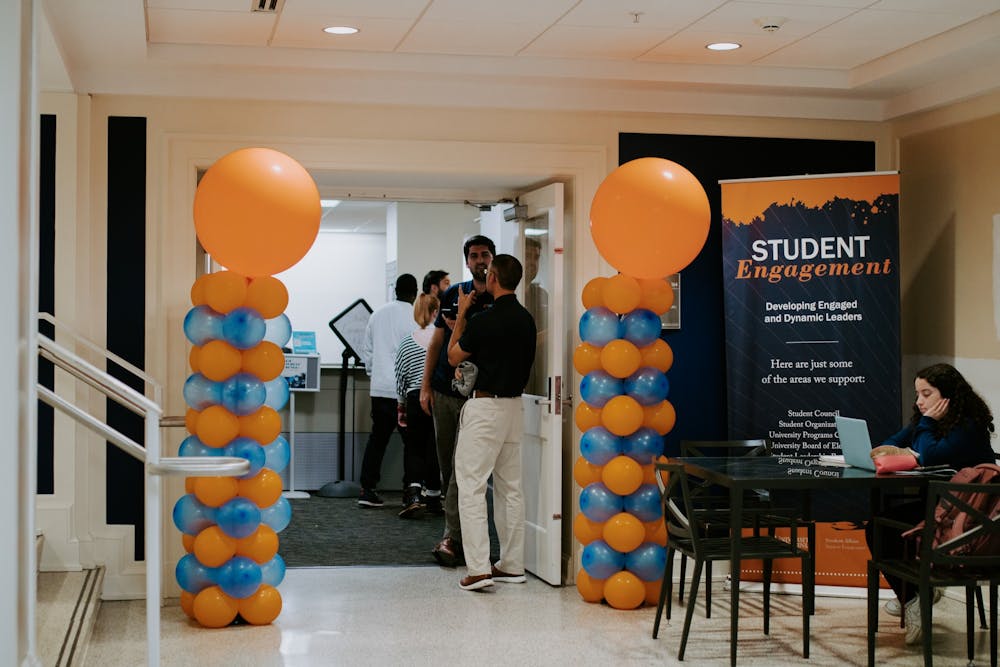Finding a sense of belonging and community is an integral part of the college experience. For first-generation students, this goal can be especially difficult to achieve as they venture into unfamiliar territory. To create a scaffold of support that addresses the specific needs of first-generation students at the University level, the Department of Student Affairs has a fully staffed office dedicated to the Hoos First Program, which organizes events like Hoos First Week in celebration and recognition of the first-generation community at the University.
The week is being celebrated from Nov. 7 through Nov. 11 and recognizes the achievements of more than 1,700 first-generation students, faculty and staff.
The University defines first-generation students as “any student where neither parent or guardian obtained a four-year degree.” Third-year Education student Alvin Nguyen, a first-generation student, said he feels the week-long celebration was a crucial step in increasing the visibility of the first-generation student experience at the University.
Nguyen said he hopes the University will keep up the momentum and continue supporting first-generation students.
“A whole week dedicated to students like me is nice,” Nguyen said. “I would just hope that after this week is over, [the University] continue[s] to be open about things and have an open door policy.”
A variety of programs and events are scheduled for the week, such as the Career Center’s First Generation Career Conversation Drop-ins, First Generation Study Café at the libraries and the First Generation Day Party hosted by Student Affairs. Resources such as the Walentas Scholarship, QuestBridge Scholars Network Chapter and the First Generation/Low Income Partnership also aim to empower first-generation students and create community.
Aiding specifically in the transition from high-school to college, the Engineering Summer Bridge Program is designed to support first-generation college students and other underrepresented minorities in the domains of science, technology, engineering and mathematics.
Fourth-year Engineering student Thomas Ortega participated in the program the summer before his first year. The program enabled him to become acquainted with the rigor of college classes, resources offered to students and the culture on Grounds.
As an out-of-state student originating from California, Ortega credits his time in the Bridge cohort to streamlining the transition to college. To this day, the fellow students Ortega met that summer are still his best friends, four years later.
“By the time I was a first-year, because I had done that program … I knew a lot about U.Va., where my classes were and had a group of friends already,” Ortega said.
First-generation students at the University make up a small percentage of each graduating class, with only 15 percent of the Class of 2026 being first-generation students. As such, it can be difficult for first-generation students to find others who relate to and understand their unique experience.
Ortega said he experienced substantial social obstacles during his first year at the University as a first-generation student. He found that students who shared his background struggled with a prevalent sense of imposter syndrome and discovered his peers felt like outsiders at the University because most students couldn’t relate to them. As such, he made conscious efforts to connect with other first generation students to build a sense of solidarity.
“Sometimes [being a first generation student] makes it hard for you to feel like people understand you,” Ortega said. “A lot of students aren't first-gen or can't really understand the certain types of mindsets first-gen students can have. So finding that community is really important, because then you know you're not alone.”
In addition to programs initiated by the University such as Hoos First Week, there are also some outside organizations who are committed to supporting first-generation students in their college journey. For example, the Charlottesville-based nonprofit Rise Together, is dedicated to providing first generation students as well as low-income students with the resources to succeed in post-secondary education. Nguyen volunteered as a first-year at Rise Together, and his experience there gave him a sense of belonging during his first year.
“It was my first chance to feel at home at U.Va.,” Nguyen said. “There was some type of purpose. I had somewhere to be. I had some type of obligation and I could say I'm doing more than just studying all the time.”
Nguyen recalled an event for first-generation students similar to Hoos First Week during his first semester first year. President Ryan, a first-generation student himself, spoke at the event. Through the event, Nguyen found self-confidence as he entered the University, which is exactly what Hoos First week strives to foster.
“Just to see hundreds of people in that position and [learn] that the president of the University was once in that same situation, seeing that there are people that are successful, and there are people that are going to be navigating the same obstacles alongside me was amazing for me as a first-year,” Nguyen said.







